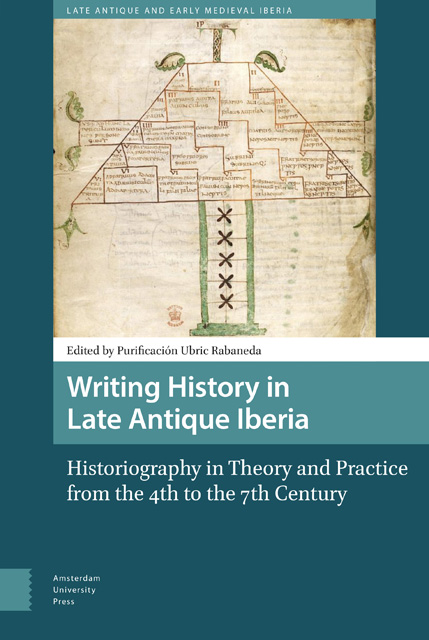 Writing History in Late Antique Iberia
Writing History in Late Antique Iberia Published online by Cambridge University Press: 18 April 2023
Abstract
Following the previous patristic tradition, the Hispano-Christian authors oriented the historical interpretation as an essential element in the anti- Jewish discourse around the concept of the Salvation History. With the coming of the Christ, the Jews are ‘evicted’ from History in favour of the Verus Israel . The Augustinian theory of the ‘witness people’ would be assumed with probative value within providentialist history to the detriment of the ancient ‘chosen people’. Subjected by divine design to Christian political power, the Jews suffer the deserved punishment for their innumerable sins. The inheritance of this stigma and the inveterate Jewish unbelief will arouse divine reprobation while allowing the Gentile people, guided by the light of the Christ, to be uniquely incorporated into the Salvation History.
Keywords: Late Antiquity, Hispano-Christian authors, History of Salvation, Anti-Jewish polemics.
Devoto pueblo cristiano,
este misterio notad:
cómo el gran Vespasiano
siendo emperador romano
tuvo grave enfermedad,
que jamás salud halló
en los sus dioses vacíos
hasta que Dios lo sanó,
cuya muerte prometió
de vengarla en los judíos.
Y salió con grade armada
y militar aparato,
y por él fue derribada
Jerusalén y asolada
la sinagoga y Pilato.
Aucto de la destruición de Jerusalén
(finales del siglo XV), versos 1-15.
Introducción: la herencia escrituaria
Uno de los principios ideológicos que la clase intelectual pagana reprochaba al ‘naciente’ cristianismo era la ‘novedad’, su falta de antigüedad y de una tradición suficientemente consolidada que avalase su doctrina. Por ello, a sus ojos, carecía por completo de legítima autoridad. Los defensores a ultranza de las ancestrales creencias arraigadas en el mundo grecorromano recelaban de las nuevas formas de culto religioso por considerar que en su seno escondían la expresión de dañinas supersticiones. De ahí que los apologistas se apresuraran a presentar como propios los sagrados escritos de la tradición judía, asegurando que existía una estrecha vinculación entre los antiguos profetas y la doctrina cristológica que fundamentaba la creencia cristiana. La literatura bíblica proporcionaba así a los cristianos una respetable antigüedad, mayor incluso de la que gozaban los propios mitos grecorromanos. La Biblia se convirtió, de hecho, en la depositaria de la ‘verdad histórica’, si bien el sentido de muchos de sus libros no parecía del todo claro.
To save this book to your Kindle, first ensure [email protected] is added to your Approved Personal Document E-mail List under your Personal Document Settings on the Manage Your Content and Devices page of your Amazon account. Then enter the ‘name’ part of your Kindle email address below. Find out more about saving to your Kindle.
Note you can select to save to either the @free.kindle.com or @kindle.com variations. ‘@free.kindle.com’ emails are free but can only be saved to your device when it is connected to wi-fi. ‘@kindle.com’ emails can be delivered even when you are not connected to wi-fi, but note that service fees apply.
Find out more about the Kindle Personal Document Service.
To save content items to your account, please confirm that you agree to abide by our usage policies. If this is the first time you use this feature, you will be asked to authorise Cambridge Core to connect with your account. Find out more about saving content to Dropbox.
To save content items to your account, please confirm that you agree to abide by our usage policies. If this is the first time you use this feature, you will be asked to authorise Cambridge Core to connect with your account. Find out more about saving content to Google Drive.